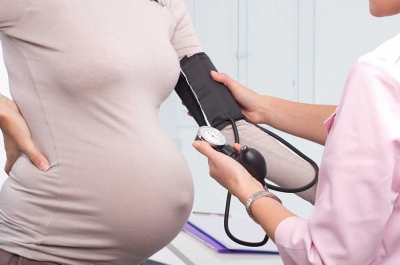PREECLAMPSIA BY DENNIS
PREECLAMPSIA
Preeclampsia is a pregnancy complication characterized by high blood pressure and signs of damage to another organ system, most often the liver and kidneys.
Preeclampsia usually begins after 20 weeks of pregnancy in women whose blood pressure had been normal. Even a slight rise in blood pressure may be a sign of preeclampsia.
Left untreated, preeclampsia can lead to serious — even fatal — complications for both you and your baby. If you have preeclampsia, the only cure is delivery of your baby.
If you’re diagnosed with preeclampsia too early in your pregnancy to deliver your baby, you and your doctor face a challenging task. Your baby needs more time to mature, but you need to avoid putting yourself or your baby at risk of serious complications.
Symptoms
Preeclampsia sometimes develops without any symptoms. High blood pressure may develop slowly, or it may have a sudden onset. Monitoring your blood pressure is an important part of prenatal care because the first sign of preeclampsia is commonly a rise in blood pressure. Blood pressure that exceeds 140/90 millimeters of mercury (mm Hg) or greater — documented on two occasions, at least four hours apart — is abnormal.
Other signs and symptoms of preeclampsia may include:
*Excess protein in your urine (proteinuria) or additional signs of kidney problems
Severe headaches
Changes in vision, including temporary loss of vision, blurred vision or light sensitivity
Upper abdominal pain, usually under your ribs on the right side
Nausea or vomiting
Decreased urine output
Decreased levels of platelets in your blood (thrombocytopenia)
Impaired liver function
Shortness of breath, caused by fluid in your lungs
Sudden weight gain and swelling (edema) — particularly in your face and hands — may occur with preeclampsia. But these also occur in many normal pregnancies, so they’re not considered reliable signs of preeclampsia.
When to see a doctor
Make sure you attend your prenatal visits so that your care provider can monitor your blood pressure. Contact your doctor immediately or go to an emergency room if you have severe headaches, blurred vision or other visual disturbance, severe pain in your abdomen, or severe shortness of breath.
Because headaches, nausea, and aches and pains are common pregnancy complaints, it’s difficult to know when new symptoms are simply part of being pregnant and when they may indicate a serious problem — especially if it’s your first pregnancy. If you’re concerned about your symptoms, contact your doctor.
Prevention
———–
Researchers continue to study ways to prevent preeclampsia, but so far, no clear strategies have emerged. Eating less salt, changing your activities, restricting calories, or consuming garlic or fish oil doesn’t reduce your risk. Increasing your intake of vitamins C and E hasn’t been shown to have a benefit.
Some studies have reported an association between vitamin D deficiency and an increased risk of preeclampsia. But while some studies have shown an association between taking vitamin D supplements and a lower risk of preeclampsia, others have failed to make the connection.
Check your blood pressure and sugar today and always remember your health first
By : Dennis Ansu Gyeabour: Nurse
Latest from Jefferson Agbotro Kwasi
Leave a comment
Make sure you enter all the required information, indicated by an asterisk (*). HTML code is not allowed.
